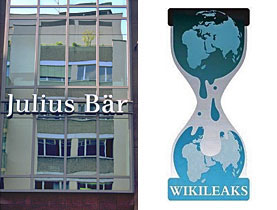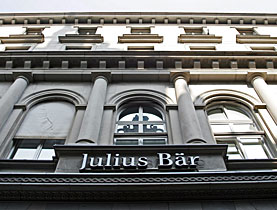Swiss bank halts Wikileaks suit

Private bank Julius Bär has dropped a lawsuit against the whistleblower website Wikileaks after its legal action against the organisation quickly turned into a public debacle.
Last month the Zurich-based bank succeeded in shutting down the website’s operations in the United States. Wikileaks had posted documents allegedly exposing illegal activities by Julius Bär customers in the Cayman Islands.
The private bank claimed its documents were stolen and supplied to the site by a former employee.
In early February filings, lawyers said they were seeking to stop what they described as “unlawful dissemination of stolen bank records and personal account information of its customers”.
But the bank was soon forced to deny critics’ charges that it was undermining free speech.
In a motion of voluntary dismissal filed on Wednesday, Julius Bär did not elaborate on why it had dropped its lawsuit – and it reserved the right to re-file at some point in the future.
Lawyers said they “may, at their option, later pursue their claims, including in an alternative court, jurisdiction or venue”.
However, the US-based non-profit Electronic Frontier Foundation (EFF) said it would be unlikely.
The bank’s American lawyer, William Briggs, did not comment.
Unwanted attention
Julius Bär gained worldwide attention when it commenced legal proceedings against Wikileaks and its US hosting company Dynadot.
But to the chagrin of the Swiss bank, a ruling ordering the website shut down ended up producing the opposite effect.
Wikileaks quickly transferred the information to foreign-based “mirror” sites and similar sites around the world began taking up the cause. In the internet world, this phenomenon is known as the “Streisand effect”.
The move was also derided by civil libertarians and free speech advocates, who had moved to intervene in the case. Three prominent organisations included the EFF, the California chapter of the American Civil Liberties Union and the Project on Government Oversight.
In a statement posted on its website on Wednesday, the EFF said it was pleased with the bank’s move in what it called an “ill-conceived” lawsuit.
Wikileaks claims to have posted 1.2 million leaked government and corporate documents that it says expose unethical behaviour.
swissinfo with agencies
The “Streisand effect” occurs when attempts to suppress information on the internet backfire, causing them to actually gain more traction.
The expression came into being after the singer Barbra Streisand attempted to have satellite photographs of her California beachfront property taken offline. Instead, they were widely disseminated by bloggers and through file sharing networks.
It is considered a grassroots response when freedom of speech is perveived to be threatened.
The roots of Julius Bär can be traced back to the creation in 1890 of the bank’s forerunner, Hirschhorn & Grob.
In 1896, Julius Bär joined the bank. Five years later, he took complete control and renamed the bank after himself.
It opened offices on Wall Street in 1940, in London in 1982 and in Hong Kong three years later.
Julius Bär earned net profits of SFr1.14 billion in 2007, a 31% rise from the previous year. The bank employs 4,100 people.

In compliance with the JTI standards
More: SWI swissinfo.ch certified by the Journalism Trust Initiative



You can find an overview of ongoing debates with our journalists here. Please join us!
If you want to start a conversation about a topic raised in this article or want to report factual errors, email us at english@swissinfo.ch.